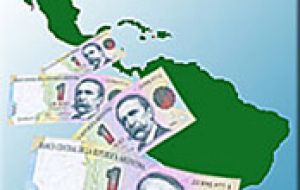MercoPress. South Atlantic News Agency
Argentine peso, 25% below “equilibrium exchange point”

Five years after the melting of the Argentine economy and one of the country's major financial setbacks including a massive devaluation, Argentina has the least valued currency against the US dollar, according to a panel of economists from J P Morgan investment bank.
Brazil's currency on the other hand, Real is overvalued and should be rated at 2.47 to the US dollar instead of 2.15. The panel of JP Morgan's economists analyzed twenty countries and arrived to the conclusion that Argentina's peso is the most depreciated currency and 25% below its equilibrium point, which means the US dollar, should be costing 2.44 pesos and not 3.05 as is the case currently. To achieve what is described as the "equilibrium exchange rate", which happens to be the expertise of JP Morgan, economists take into account factors such as productivity, external prices, countries' risks, different interest rates and other variables. Similarly to the Argentine peso, the US dollar is behind its equilibrium exchange rate point against the Euro by 10%, and the Japanese Yen, Chilean Peso and Peruvian Inti, range behind the US dollar by 11%, 7% and 11% respectively. On the other hand the Brazilian Real and the Mexican Peso, taking the US dollar as reference, are overvalued 13% and 4%. In spite of the general appreciation of all Latinamerican currencies in the last 12/18 months, the Argentine peso remains the least revalued of all the region's currencies. According to the United Nations Economic Commission for Latinamerica, CEPAL, preliminary balance, overall Latinamerican currencies last year averaged a 5.1% appreciation against the US dollar. For this year, JP Morgan forecasts the Peso will undergo a slight appreciation, probably 3%, which means the exchange rate at the end of 2007 will have a nominal rate of 3.15 pesos to the US dollar. The exchange rate is crucial for Argentina's current development, and fiscal, model since 10% of 2006 total tax revenue, 50 billion US dollars, came from taxes on exports, mainly agriculture commodities. Under an equilibrium exchange rate situation, (2.44 pesos to the US dollar) the Argentine Treasury could not possibly collect those 5 billion. In related news another international bank, HSBC, released a report under the title of "Too good to be true", warning about over optimism regarding the real performance of the world's economy. "The forecasts consensus is that we are living in the best of possible worlds", but HSBC warns about the risks of a burst of the US real estate and housing bubble which could have turbulence reverberations for the world economy. Regarding Argentina, HSBC forecasts a 7.1% growth in 2007, which is below 2006, "but energy restrictions could seriously limit activity this year".




Top Comments
Disclaimer & comment rulesCommenting for this story is now closed.
If you have a Facebook account, become a fan and comment on our Facebook Page!